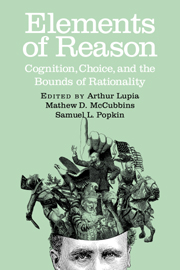Book contents
- Frontmatter
- Contents
- List of Tables and Figures
- Acknowledgments
- List of Contributors
- Beyond Rationality: Reason and the Study of Politics
- PART I EXTERNAL ELEMENTS OF REASON
- 2 Shared Mental Models: Ideologies and Institutions
- 3 The Institutional Foundations of Political Competence: How Citizens Learn What They Need to Know
- 4 Taking Sides: A Fixed Choice Theory of Political Reasoning
- 5 How People Reason about Ethics
- 6 Who Says What? Source Credibility as a Mediator of Campaign Advertising
- 7 Affect as Information: The Role of Public Mood in Political Reasoning
- PART II INTERNAL ELEMENTS OF REASON
- References
- Author Index
- Subject Index
4 - Taking Sides: A Fixed Choice Theory of Political Reasoning
Published online by Cambridge University Press: 05 June 2012
- Frontmatter
- Contents
- List of Tables and Figures
- Acknowledgments
- List of Contributors
- Beyond Rationality: Reason and the Study of Politics
- PART I EXTERNAL ELEMENTS OF REASON
- 2 Shared Mental Models: Ideologies and Institutions
- 3 The Institutional Foundations of Political Competence: How Citizens Learn What They Need to Know
- 4 Taking Sides: A Fixed Choice Theory of Political Reasoning
- 5 How People Reason about Ethics
- 6 Who Says What? Source Credibility as a Mediator of Campaign Advertising
- 7 Affect as Information: The Role of Public Mood in Political Reasoning
- PART II INTERNAL ELEMENTS OF REASON
- References
- Author Index
- Subject Index
Summary
Does it make sense to speak of ordinary citizens as being able to reason about political choices? The most widely accepted answer, certainly since publication of Philip Converse's (1964) seminal study, “The Belief Systems of Mass Publics,” is less than reassuring. Setting aside only a thin stratum of the politically engaged and aware, ordinary citizens as a rule do not pay close attention to politics, are not well informed about it, and have not thought through their ideas about it (Delli Carpini and Keeter 1996). The architecture of mass belief systems is believed more nearly to resemble, to borrow a metaphor from Rae (1981: 2), a jester's church rather than a cathedral, with their principal compartments unconnected or even butting into one another. The political convictions that citizens avow tend to have embarrassingly little to do with their actual positions on the issues of the day (e.g., Levitan and Miller 1979). Moreover, the political rights that they declare sacred in the abstract – freedom of expression, due process of law, among them – often disappear in the heat of controversy (McClosky 1958). Their political stands are, in sum, minimally grounded on political principle, minimally informed by a knowledge of political affairs, minimally stable, and, above all, minimally coherent.
Minimalism, it is fair to say, is still the accepted view of public opinion. Of course in political science, to describe a particular view as the most widely accepted is only to say that it is the one most often attacked.
- Type
- Chapter
- Information
- Elements of ReasonCognition, Choice, and the Bounds of Rationality, pp. 67 - 84Publisher: Cambridge University PressPrint publication year: 2000
- 85
- Cited by



